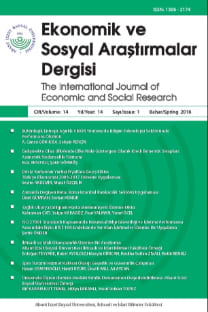VERGİ MÜKELLEFLERİNİN KAYIT DIŞI EKONOMİ ALGISI: TÜRKİYE ÜZERİNE AMPİRİK BİR ÇALIŞMA
Kayıt dışı ekonomi, Vergisiz ekonomi, Vergi yükü, Kamusal harcamalar
The Informal Economy Perception of Taxpayers: An Emprical Study on Turkey
Informal economy, Non-taxed economy, Tax burden, Public expenditures,
- ISSN: 1306-2174
- Yayın Aralığı: 2
- Başlangıç: 2005
- Yayıncı: Abant İzzet Baysal Üniversitesi İktisadi ve İdari Bilimler Fakültesi
VERGİ MÜKELLEFLERİNİN KAYIT DIŞI EKONOMİ ALGISI: TÜRKİYE ÜZERİNE AMPİRİK BİR ÇALIŞMA
İhsan Cemil DEMİR, Mustafa KÜÇÜKİLHAN
KOZMETİK ÜRÜNLERDE KADINLARIN DÜRTÜSEL SATIN ALMA DAVRANIŞLARINI ETKİLEYEN FAKTÖRLERİN ANALİZİ
EKONOMİK HOŞNUTSUZLUĞUN POLİTİK EKONOMİSİ: TÜRKİYE ÜZERİNE ZAMAN SERİLERİ ANALİZİ, 1980-2010
HAVA YOLU HİZMET KALİTESİNİN SERVPERFSERVQUAL ÖLÇEĞİ İLE DEĞERLENDİRMESİ VE İSTATİSTİKSEL ANALİZİ
EĞİTİM VE SAĞLIK İLİŞKİSİ: PANEL EŞBÜTÜNLEŞME VE PANEL NEDENSELLİK ANALİZİ
İŞLETMELERDE SORUMLULUK MERKEZLERİNİN STRATEJİK KONTROL VE MUHASEBE SİSTEMİ AÇISINDAN ANALİZİ
Abdullah KARAKAYA, Halim AKBULUT
FUAT MİRAS’IN TOBB (TÜRKİYE ODALAR VE BORSALAR BİRLİĞİ) BAŞKANLIĞI DÖNEMİ’NDE TOBBSİYASET İLİŞKİSİ
Hüseyin ÇAVUŞOĞLU, Özcan SEZER
TÜRKİYE’DE ULAŞTIRMA SEKTÖRÜ ENERJİ TÜKETİMİNİN AZALTILMASI: BİR SENARYO YAKLAŞIMI
